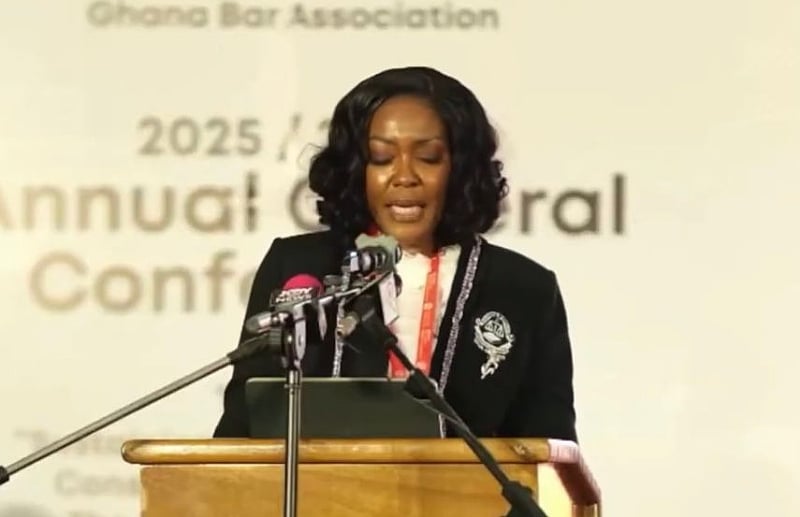The Ghana Bar Association (GBA) has expressed deep concern over the potential erosion of free speech in the country, warning against a creeping “culture of silence” under the guise of curbing abusive political discourse. While acknowledging the need for civility in public debate, the GBA emphasizes that this imperative must not come at the cost of fundamental constitutional freedoms. The association’s president, Efua Ghartey, articulated this position during the opening of the 2025 Annual Bar Conference, highlighting a worrying trend of suppressing dissenting voices and the chilling effect this could have on democratic participation. She stressed that while incivility in political discourse is indeed a problem, efforts to address it must not infringe upon the core tenets of Ghana’s constitutional framework.
Ghartey specifically pointed to a recent court ruling as a stark example of this concerning trend. An Accra Circuit Court judge, His Honour Samuel Bright Acquah, remanded NPP Bono Regional Chairman Kwame Baffoe (Abronye DC) while citing Idi Amin and George Orwell’s Animal Farm to justify his decision. The GBA President found this deeply troubling, emphasizing the incompatibility of such references with Ghana’s constitutional democracy, established over 30 years ago. She argued that relying on the words of a dictator like Amin and the dystopian themes of Animal Farm to justify a legal decision undermines the principle of equality before the law, a cornerstone of the 1992 Constitution. The invocation of such figures and literary works, according to the GBA, suggests a dangerous disregard for democratic values and the potential for authoritarian overreach.
The GBA’s concern stems from the broader implications of this case and the potential it represents for a wider suppression of free speech. The association fears that such rulings could create a chilling effect, discouraging citizens from exercising their right to express dissent for fear of legal repercussions. This fear, in turn, could lead to a “culture of silence,” where critical voices are silenced and open dialogue is stifled, ultimately undermining the foundations of a healthy democracy. The GBA maintains that robust public discourse, even if sometimes contentious, is essential for a vibrant democratic society.
The association further argues that the focus should be on fostering constructive dialogue and promoting media literacy rather than resorting to restrictive measures that curtail fundamental freedoms. While acknowledging the challenges posed by the often-uncivil nature of online political discourse, particularly on new media platforms, the GBA emphasizes the importance of addressing this issue through education and promoting responsible communication rather than through legal crackdowns. The association believes that empowering citizens to critically analyze information and engage in respectful debate is a more effective long-term solution than censorship or legal intimidation.
The GBA calls for a renewed commitment to upholding the principles of free speech enshrined in the Constitution. It urges lawyers and citizens alike to actively defend this fundamental right, echoing Voltaire’s famous principle of defending even the speech one disagrees with. The association emphasizes that constant vigilance is crucial to safeguarding Ghana’s constitutional democracy and preventing a slide towards authoritarianism. The GBA’s stance highlights the importance of striking a delicate balance between maintaining civility in public discourse and protecting the fundamental right to free expression.
In essence, the GBA’s warning serves as a critical reminder of the fragility of democratic freedoms and the constant need to safeguard them against erosion. The association’s concerns underscore the potential dangers of prioritizing civility over freedom of expression, arguing that such an approach could ultimately lead to a society where dissenting voices are silenced and critical dialogue is suppressed. The GBA’s call to action emphasizes the role of both legal professionals and citizens in defending the constitutional right to free speech, recognizing that the preservation of this fundamental right is essential for the continued health and vitality of Ghana’s democracy.














